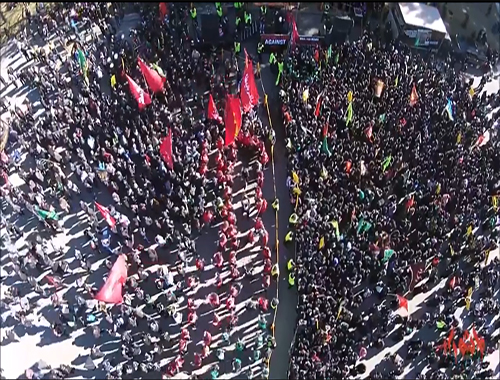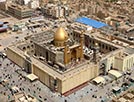Chapter one: MÄ«qÄts
- Details
- Hits: 1974
Chapter one: MÄ«qÄts
They are the sites determined for doing ihÌ£rÄm, they as the follows:
First: Masjid al-Shajarah. It is located in the region of Dhil-hÌ£alÄ«fah near Medina al-munawwarh and it is the mÄ«qÄt of the people of Medina and those who want to go to hajj through it (Medina).
Issue 78. It is not permissible to delay ihÌ£rÄm from masjid al-Shajarah to JuhÌ£fah unless there is a necessity like illness, weakness or other excuses.
Issue 79. It is invalid to do ihÌ£rÄm outside masjid al-Shajarah. However, it is valid to do it in any part of the masjid even the new parts.
Issue 80. A woman with an excuse (e.g. during her periods) must do ihÌ£rÄm at the time when she crosses the masjid, if the crossing does not entail staying in it. If staying is necessary (due to crowd or something else) and she could not delay the ihÌ£rÄm till the excuse is over, she must do ihÌ£rÄm from JuhÌ£fah or one of the parallel. She is also allowed to do ihÌ£rÄm by nadhr from any place before the mÄ«qÄt.
Issue 81. If the husband is absent, it is not a condition to obtain his permission for the achievement of the nadhr of his wife to do ihÌ£rÄm before the mÄ«qÄt. But if he is present, it is based on obligatory caution to obtain his permission; otherwise her nadhr will be invalid.
Second: WÄdÄ« al-‘aqÄ«q, which is the mÄ«qÄt of the people from Iraq and Najd and those who want to pass this place for ‘umrah which has three portions: Maslakh, i.e. its first portion; al-Ghamrah, the middle; and DhÄt al-‘irq, the last portion. IhÌ£rÄm at any of these portions is valid.
Third: Juhfah. It is the mÄ«qÄt of the people of Syria and the surrounding, Egypt, Maghrib and those who pass this place for ‘umrah. IhÌ£rÄm is valid either from the masjid or other places there.
Forth: Yalamlam, which is the mÄ«qÄt of the people of Yaman and those who pass it. It is a name for a mountain. IhÌ£rÄm is valid from any part of it.
Fifth: Qarn al-ManÄzil, which is the mÄ«qÄt of the people of TÄ’Ä«f and those who pass it for ‘umrah. IhÌ£rÄm is valid either from the masjid or from other places there.
The places parallel to the previous mÄ«qÄts:
If one does not pass one of the previous mÄ«qÄts but reaches a place just parallel to one of them, he can do ihÌ£rÄm from there. Parallel means to reach a point, on his way to Mecca, in which the mÄ«qÄt lies to the right or the left of him in such a way that if he goes forward, the mÄ«qÄt will be located behind him.
The mentioned mÄ«qÄts are those in which one should do ihÌ£rÄm for ‘umrah of tamattu‘, while the mÄ«qÄts of Hajjat al-tamattu‘, qirÄn and ifrÄd are:
First: Mecca, which is the mÄ«qÄt of ahjj al-tamattu‘.
Second: The mukallaf's house, which is the mÄ«qÄt of those who live between Mecca and the mentioned mÄ«qÄts. It is also the mÄ«qÄt for people of Mecca, so they are not obliged to return back to one of the mentioned mÄ«qÄts for doing ihÌ£rÄm.
Third: AndÄ al-hill, It is the mÄ«qÄt of ‘umrah al-mufradah for the individuals who are inside Mecca al-Mukarramah. Among the AndÄ al-hÌ£ill places, the best are HÌ£udaybiyyah, Ja’rÄnah and Masjid al-Tan’Ä«m.
MÄ«qÄt issues
Issue 82. If one cannot locate the mÄ«qÄt or its parallel, it can be determined by shar‘Ä« evidence i.e. by the testimony of two just witnesses or the publicity which brings about confidence, and it is not obligatory to investigate it. If all evidences are lost, it is enough to suffice with the possibility of more than 50 percent obtained from the saying of anyone who knows the region.
Issue 83. Doing ihÌ£rÄm before mÄ«qÄt is invalid unless one makes a nadhr to do ihÌ£rÄm before the mÄ«qÄt in a certain place e.g. Medina or his country. Then he is obliged to do ihÌ£rÄm from there and it is valid.
Issue 84. If one passes the mÄ«qÄt without ihram on purpose or due to ignorance or neglect, he should return to mÄ«qÄt to put on ihram there.
Issue 85. If one passes the mÄ«qÄt without ihÌ£rÄm due to negligence, forgetfulness or ignorance of the ruling, then if he cannot return to the mÄ«qÄt due to shortage of time or another excuse while he has not yet entered the HÌ£aram, then based on obligatory caution to go as near as possible to the mÄ«qÄt and do ihÌ£rÄm there. If he is already inside the HÌ£aram, then if he can go out he is obiged to do so and to put on ihram out of the haram but if he cannot go out, he should do ihÌ£rÄm inside the HÌ£aram at the point he is.
Issue 86. In normal conditions it is not permissible to delay ihÌ£rÄm beyond the mÄ«qÄt whether there is another mÄ«qÄt in front of him or not.
Issue 87. One who has been prevented from wearing ihÌ£rÄm in one of the mÄ«qÄts is allowed to do so in another one.
Issue 89. Jaddah is neither a mÄ«qÄt nor a parallel region. Thus, doing ihÌ£rÄm for ‘umrah of tamattu‘ there, in normal conditions, is incorrect and one must go to a mÄ«qÄt to do ihÌ£rÄm, as long as he could. Otherwise, based on caution, he should do ihÌ£rÄm by nadhr in Jaddah.
Issue 90. If a muhÌ£rim, after passing the mÄ«qÄt, becomes aware that his ihÌ£rÄm was incorrect, if, then, he can return to it, he is obliged to. While if he cannot do so but by passing through Mecca al-mukarramah, he must do ihÌ£rÄm from Adnal-hill and enter Mecca for ‘umrah al-mufradah. Then, after performing it he should return back to one of the mÄ«qÄts to do ihÌ£rÄm for ‘umrah of tamattu‘
Issue 91. Apparently it is allowed for someone who is confident that he will not miss the hajj to get out of Mecca after he becomes free of ihÌ£rÄm of ‘umrah of tamattu‘, although, based on mustahÌ£abb caution, it is better not to get out but for urgency and need. Again, it is based on caution to do ihÌ£rÄm for hajj in Mecca before getting out unless it would cause extraordinary hardship for him in which case he may go out of Mecca without ihram. One who wants to apply this caution and who is compelled to get out of Mecca one or more times, e.g. the workers of caravans and the likes, he can perform ‘umrah al-mufradah first to enter Mecca and delay ‘umrah of tamattu‘ until the time he could perform it just before hajj practices. At that time he would do ihÌ£rÄm for ‘umrah of tamattu‘ from the mÄ«qÄt and after finishing it he would do ihÌ£rÄm for hajj in Mecca.
Issue 92. By getting out of Mecca between ‘umrah of tamattu‘ and hajj it is meant to get out of the contemporary Mecca al-mukarramah. Thus to go to a place which is now regarded inside Mecca is not considered as getting out, even if it was outside before.
Issue 93. After completing ‘umrah al-tamattu‘, if one leaves Mecca without ihÌ£rÄm, then if they return to Mecca during the same month, there is no need to renew ihÌ£rÄm for entering Mecca. But, if they return during the next month, e.g. they perform ‘umrah during the month of Dhul-Qi’dah and leave but return to Mecca during Dhul-Hijjah, they are obliged to enter a new ihÌ£rÄm for a new ‘umrah to enter Mecca and their ‘umrah al-tamattu‘ which is connected with hajj rites will be this second one.
Issue 94. It is based on obligatory caution not to perform ‘umrah al-mufradah between ‘umrah of tamattu‘ and hajj, although performing it will not harm either the validity of one's previous ‘umrah or that of hajj.











